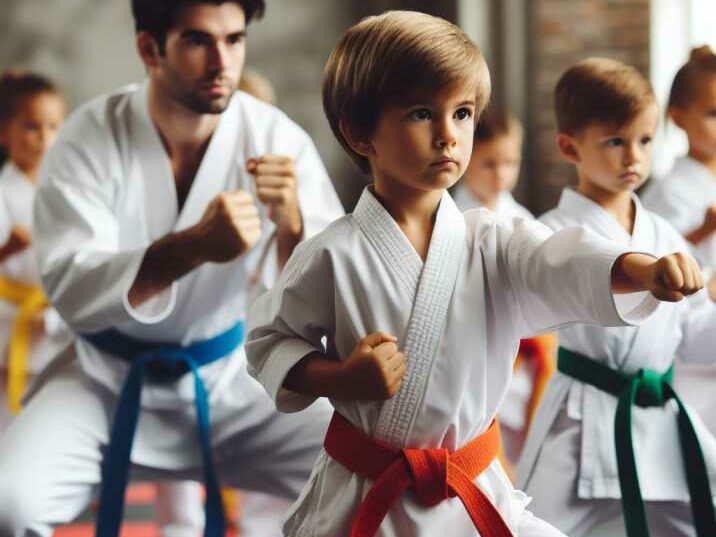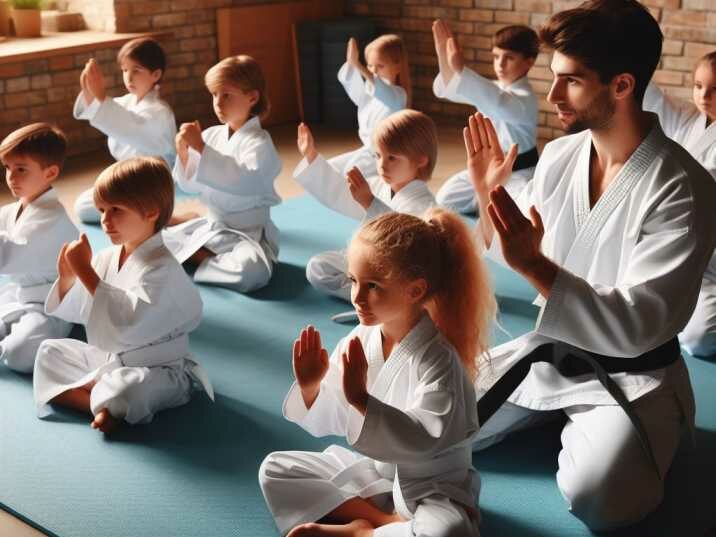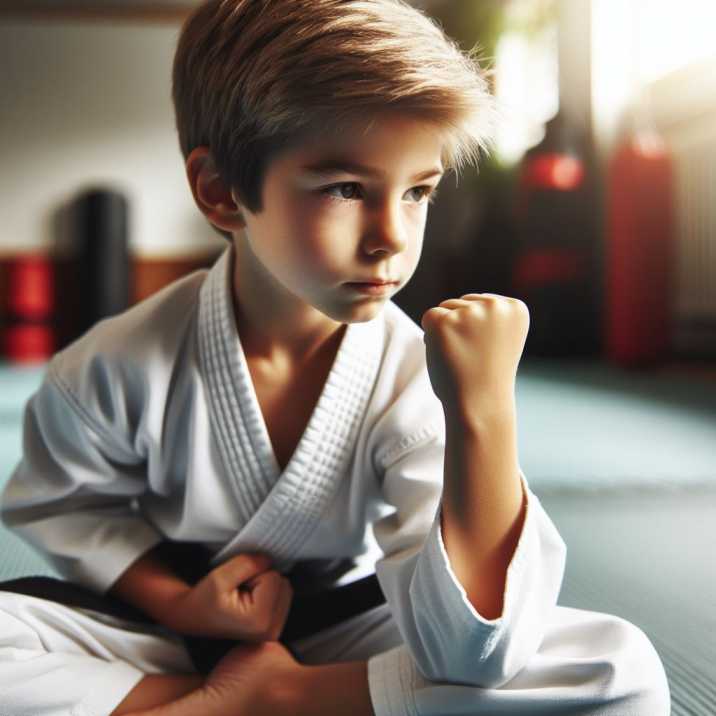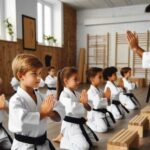7 Transformative Benefits of Kids Martial Arts
Table of Contents
Introduction
In today’s fast-paced world, where distractions are abundant and physical activity is often overlooked, parents are increasingly turning to martial arts as a holistic approach to their children’s development. Kids martial arts programs offer far more than just kicks and punches; they provide a foundation for building essential life skills. Let’s delve into the world of kids martial arts and explore why it has become a popular choice for parents seeking a comprehensive developmental activity for their children.

Importance of Kids Martial Arts
A. Beyond Physical Fitness
Kids martial arts is not merely about physical exercise; it’s a multifaceted approach to nurturing a child’s overall well-being. It combines elements of physical fitness, mental discipline, and character development, making it a unique and valuable activity for children of all ages.
Choosing the Right Martial Art for Kids
A. Understanding Different Martial Arts
The first step in enrolling your child in a martial arts program is understanding the various disciplines available. From karate to taekwondo, each martial art has its own philosophy and techniques. It’s essential to choose one that aligns with your child’s interests and values.
B. Considering Age and Personality
Not all martial arts are suitable for every age group. Consider your child’s age and personality when selecting a program. Some children may thrive in the structure of traditional martial arts like karate, while others may prefer the dynamic movements of taekwondo.

Building Confidence Through Martial Arts
A. Overcoming Challenges
Martial arts instill a sense of accomplishment as children overcome challenges and progress through belt levels. The gradual and structured nature of martial arts allows kids to build confidence at their own pace.
B. Setting and Achieving Goals
Goal-setting is a fundamental aspect of martial arts. Whether it’s mastering a new technique or earning a higher belt, the process of setting and achieving goals teaches children the value of perseverance and hard work.
Discipline and Focus
A. Teaching Self-Control
Discipline is a cornerstone of martial arts education. Kids learn to control their impulses, follow instructions, and respect authority, skills that extend beyond the martial arts studio into daily life.
B. Enhancing Concentration Skills
The intricate movements and sequences in martial arts demand concentration. As children engage in these activities, they naturally develop enhanced focus and attention to detail.
Social Skills Development
A. Teamwork and Respect
Many kids martial arts classes involve group activities, fostering teamwork and collaboration. Children learn to respect their peers and instructors, creating a positive and supportive community.
B. Creating Lifelong Friendships
The shared experiences and challenges in martial arts often lead to lasting friendships. Kids bond over their martial arts journey, creating a sense of camaraderie that extends beyond the studio.
Physical Fitness and Coordination
A. Improving Motor Skills
The physical movements in martial arts contribute to improved coordination and motor skills. These benefits extend to other physical activities, enhancing a child’s overall athleticism.
B. Encouraging an Active Lifestyle
In a world dominated by screens, martial arts provide a physically engaging alternative. It encourages an active lifestyle, instilling habits that can last a lifetime.
Safety and Self-Defense
A. Empowering Kids with Self-Defense Skills
One of the practical aspects of kids martial arts is the focus on self-defense. Children learn valuable techniques that can empower them to protect themselves if the need arises.
B. Creating Awareness Without Fear
Martial arts training emphasizes awareness and prevention rather than fear. Kids learn to assess situations and make informed decisions, contributing to their overall safety.
Finding the Right Martial Arts School
A. Researching Local Options
Choosing the right martial arts school is crucial. Research local options, read reviews, and seek recommendations to ensure the selected program aligns with your child’s needs and your expectations.
B. Visiting and Assessing Facilities
A personal visit to potential martial arts schools provides insight into the environment, teaching methods, and overall atmosphere. Assessing these factors ensures a positive and enriching experience for your child.
The Role of Instructors in Kids Martial Arts
A. Qualified and Experienced Instructors
The competence and experience of instructors significantly impact the quality of kids martial arts education. Ensure that instructors are qualified, experienced, and have a proven track record in teaching children.
B. Personalized Teaching Approaches
Every child is unique, and effective instructors recognize this diversity. Look for programs that offer personalized teaching approaches, tailoring their methods to accommodate the individual needs of each child.
Balancing Fun and Learning
A. Incorporating Games and Challenges
Kids thrive in environments that balance learning with fun. Martial arts programs often incorporate games and challenges, making the learning process enjoyable and engaging.
B. Keeping Kids Engaged
Sustaining a child’s interest is crucial for long-term success in martial arts. Programs that keep kids engaged through innovative teaching methods and varied activities ensure a positive experience.
Common Misconceptions About Kids Martial Arts
A. Dispelling Myths
There are common misconceptions about kids martial arts, such as it promoting violence. Addressing these myths is essential to provide an accurate understanding of the positive impact martial arts can have on
Conclusion:
In the world of child development, the journey through kids martial arts emerges not just as a physical activity but as a transformative experience that shapes young minds in profound ways. From the earliest stages of practice, children embark on a path of self-discovery, building essential life skills that extend far beyond the dojo.
As we’ve explored the benefits of kids martial arts, it becomes evident that the impact goes beyond mere physical fitness. Confidence, discipline, and focus are the cornerstones of this journey, laying the groundwork for resilient, respectful, and responsible individuals. The structured environment of martial arts provides a unique platform for children to develop not only their bodies but also their characters.
In the quest for the right martial art, parents play a crucial role in supporting and reinforcing the values learned during classes. By integrating these principles into daily life, parents become essential partners in their child’s martial arts journey.
In conclusion, kids martial arts is a powerful tool for instilling values that will serve children well into adulthood. The confidence gained through achievement, the discipline cultivated through practice, and the focus honed in each session contribute to a well-rounded and empowered individual. Consider this guide as your key to unlocking the potential within your child, paving the way for a future marked by strength, resilience, and a deep sense of accomplishment. Enrolling your child in martial arts is not just an investment in their physical health; it’s an investment in their character and the foundation for a lifetime of success.

Frequently Asked Questions (FAQs):
- Why is kids martial arts beneficial for my child’s confidence?
- Martial arts builds confidence through positive reinforcement, achievable goals, and a supportive environment.
- How can martial arts help with discipline?
- Martial arts instills discipline by teaching children to set goals, persevere through challenges, and develop a strong work ethic.
- What forms of martial arts are suitable for kids?
- Karate, taekwondo, judo, and Brazilian jiu-jitsu are popular forms of martial arts suitable for children.
- How do I choose the right martial art for my child?
- Consider your child’s interests, physical abilities, and personal goals. Consulting with instructors and trying out a class can help make an informed decision.
- Is there an age limit for starting kids martial arts?
- Many martial arts schools accept children as young as four or five years old. It’s best to check with individual schools for specific age requirements.
- What role do parents play in supporting kids martial arts?
- Parents play a crucial role in reinforcing the values learned in martial arts, encouraging practice, and promoting a positive mindset.
- Can kids martial arts improve academic performance?
- Yes, the enhanced focus and discipline gained through martial arts can positively impact academic performance.
- How often should children attend martial arts classes?
- The frequency of classes depends on the child’s age, school schedule, and personal preferences. Most children attend classes two to three times per week.
- Are martial arts safe for children?
- Yes, when taught by qualified instructors in a safe environment, martial arts is a generally safe and beneficial activity for children.
- Can children with special needs participate in martial arts?
- Many martial arts schools offer inclusive programs for children with special needs. It’s essential to communicate any specific requirements with the instructors.
- Do children need special equipment for martial arts classes?
- Basic equipment may include a uniform (gi) and a belt corresponding to their rank. Some martial arts may require additional protective gear.
- How do I find a reputable kids martial arts school in my area?
- Research local martial arts schools, read reviews, and consider visiting the schools in person. Ask about the qualifications of the instructors and the school’s philosophy.


